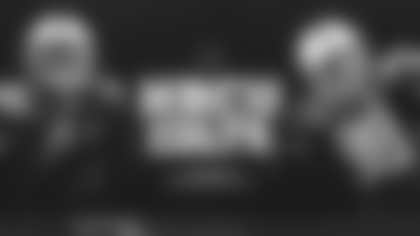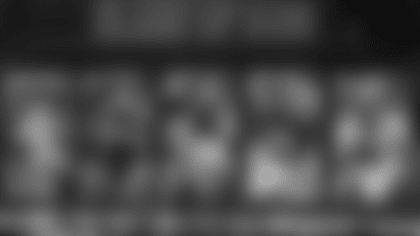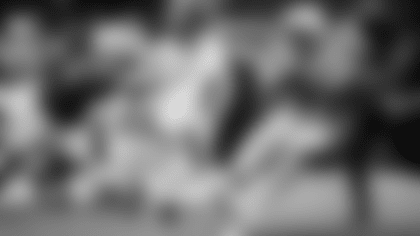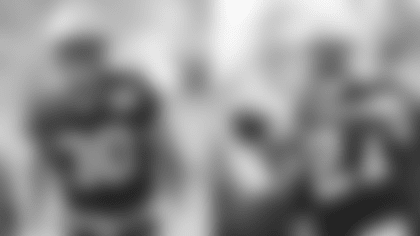What was your best sport growing up? For some people it might not have been football.
"I think my best sport growing up was baseball. I had a chance to maybe sign a professional contract, but my dad said, 'You're going to college.' I was the only member of my family to go to college. It was good advice. I was a catcher for a long time, then I ended up going to first base. I think the Phillies and Orioles were both thinking about putting me back at catcher. My brother, Denny, was two years older than me. He was always a good pitcher, and I always was the catcher. He didn't take it easy on me a bit. He brought heat and whipped me every day."
Who was the first true football influence you ever had?
"I can honestly say my first true influence was my father, and I am fortunate to say that. My dad, Bert, would take Denny and me out in the yard and throw the ball to us. It always came to us tackling each other. My dad worked seven days a week. He worked nights and missed a lot of the games. By far my biggest thrill was to have him come to Super Bowl XL when we (Pittsburgh) played Seattle. He passed away suddenly five weeks later. To see him at the Super Bowl having a blast is something I will never forget."
Those are great childhood memories, aren't they?
"Absolutely. We were living in West Virginia at the time, then we moved to York, Pennsylvania. My first Pee Wee football team, Steve Stonebreaker of the Colts came to the banquet. I got a picture with him. Actually, Ordell Braase owned the restaurant and some Colts would come by. John Unitas would come by. Unitas was my hero. The blue horseshoe has been deeply ingrained in me. I was in about seventh grade at the time. We played in Baltimore in 1998, my first year with the Colts. Peyton (Manning) and I planned to get a picture with Unitas, who was on the field that day. It didn't happen, and that is something I look back on and wished it had happened."
Was there ever a person who tried to talk you out of playing football?
"My first Pee Wee team I was the center for the first game, then I was the quarterback after that. Steve Woodard was our coach, and we had fun. It was predominantly an African-American team. We'd go on a trip on the bus, and I never ate so well in my life. All the moms were taking care of me. Back then, we'd play on Saturday mornings, so my dad would get to go because he worked at night. Then they dropped our team. Our arch-rivals survived, so we had to go play there. They put me back on the line. I said, 'No.' They tried to talk me out of it, but I wasn't going to be a lineman. Then our team started back up and I was the quarterback. We beat our rivals every time. My first year playing, I was eight, then I started playing again when I was about 10."
Why did you choose the college you chose?
"I chose Virginia Tech because of John Devlin. I got kicked out of high school and everybody who was recruiting me dropped me, except John. He told Jerry Claiborne, who was a fairly strict man, that I had transferred schools to get better credits. I made the visit, and they offered me the scholarship. They could not pull their hand back fast enough. I had a hold of it. I never looked back. They got fired the next year, and I wanted to transfer to Florida State with him (Devlin). He said, 'No.' Later when I was the head coach at Temple, he (Devlin) got fired with the (Houston) Oilers. It was during the oil bust and he was hurting. I was able to hire John as my assistant head coach. John's always been very dear to me."
What was your best collegiate experience?
"I was voted the most valuable senior by my coaches. That has stuck with me. It was a long career for me. Of the 56 scholarship freshmen, I was the only one to make it through three head coaches. We lost Coach Claiborne and Charlie Coffey came in and basically ran everybody off. I played a little bit. I backed up Don Strock for a couple of years and basically got fired my senior year. I had one more year of eligibility when Jimmy Sharpe came in. Terry Don Phillips, (now) the athletic director at Clemson, talked me into coming back. I was just trying to get a coaching job – junior high, high school, anything. I met the new coach and we instantly bonded, and he talked me into coming back out to play. I was the captain and had a really good senior year. The new coaching staff named me the outstanding player. We didn't win many games. Most of the times when a coach would say, 'Good win,' it was a highlight. For me, it was earning the respect back from the people I admired the most. That was the coaches for me. I always wanted to be a coach. I thought coaches and school teachers were rich. I wanted to be a teaching coach, and he started me into coaching."
What is your favorite quote on football, leadership, etc. that has shaped your career the most? Explain how/why/when you found it and how you have applied it.
"My favorite quote came from Paul 'Bear' Bryant, who I was very fortunate to work with at Alabama. Coach Bryant would say, 'Coach 'em hard, hug 'em later. It's not what you know, it's what you can teach.' Coach Bryant was so successful and touched so many lives, yet he was simple, direct and sincere in how to get results. Every coach who worked under him benefited from his ways, and I remind myself as often as I can about what I learned from him."
It had to be memorable working under a leader like Coach Bryant.
"It was an unbelievable learning experience every day. I was a very cocky, thought-I-knew-a-lot, young coach. He loved ripping my tail. We'd have battles, always behind closed doors. It was, 'You're doing good.' In front of the staff, he'd rip me about something. He'd bring me into his office, 'Hey, you're doing good. I like what you're doing.' I think he just wanted to know if I was going to keep coming back (with how I was coaching). Finally, he quit (retired). It was a great two years. The second year was kind of crazy. I said, 'Hey, coach, I have a shot at the Temple head coaching job.' I was 30 years old. He said, 'Really?' I said they were going to bring me in for an interview. He asked, 'Do you want it?' I told him my goal was to be a head coach, and I asked him, 'What do you think?' He said, 'You may never get another shot. If you can get it, get it.' We were going to Memphis to play in the Liberty Bowl in his last game. I'd never been in fear of losing in my life. My wife and I were sitting in our hotel room and Frank Dolson of the Philadelphia Inquirer asked for an interview. I didn't know Frank from Adam. I didn't know he was one of the most powerful writers. He said I seemed very anxious. I told him, 'I can't imagine losing this game. We can't lose his (Bryant's) last game.' Our whole team felt that way. He (Bryant) had a great calming way of settling them all down and getting them ready to play. We got back to Tuscaloosa after we won the game and I heard him whistling coming down the hallway. That was always a good sign. He poked his head in my door and asked, 'Do you want that job?' I said, 'Yes, coach.' He said, 'You got it.' He was much more human than people think. He had a great sense of people. I think he was the best personnel manager I've ever seen. We played 66 players in every game. He substituted every guy on the team. No assistant coach ever substituted a player in a game. He sent them all in and out. We played three quarterbacks, 12 running backs. He knew when to bench a guy to get him ticked off and have him ready in the fourth quarter with a chip on his shoulder. If a player were anxious, he'd pat them on the back and their feet would never touch the ground. He was the same way with anybody in the office – secretary, janitor, ticket man, anybody. He had a great sense about how people felt, like me. I was cocky all the time. He'd cut my legs out from under me where I'd be all ticked off, then he'd come pat me on the back. He had an unbelievable ability around people. Was he the most memorable person I was around? Yes and no, because I had the great pleasure of coming back for my senior year (at Virginia Tech) under Jimmy Sharpe, who was his (Bryant's) right-hand man for many years. He was the offensive coordinator for 10 years. He put in the wishbone when they (Alabama) switched over. He coached Joe Namath and Ken Stabler. He was a young 34-year old head coach who I bonded with. He's still like my second father. I knew what Coach Bryant stood for – Danny Ford, Charley Pell. They were all assistant coaches on our staff. As they left our staff to become head coaches, you knew that was the way to do it – coach 'em hard, hug 'em later."
How much of coaching is coaching the sport and how much of it is teaching young men?
"The job involves so many aspects that I think it is about 80 percent teaching, 10 percent counseling and 10 percent coaching. You deal with so many different types of individuals, and you want success for them on and off the field. Some might need more attention than others. Some may not need too much at all, but every player needs something. We have a multi-faceted job that is unique, and there are not many days that are alike."
What is the geographic area where you have lived or worked that you like the most?
"It may sound funny to say it since I am here right now, but I have not found a place better than Indianapolis. Indianapolis is great for me because of its size. There is plenty to do and what makes it the best is the people. My family and I never have found a place where we have felt more comfortable than we have here."
Who is the person most responsible for you to make it to professional football and/or the NFL?
"There are two – John Devlin, who got me into college, and Jimmy Sharpe, who got me into coaching. Jimmy got me to Alabama. Joe Pendry, who was at West Virginia when I was at Virginia Tech and knew me, got me to Kansas City with Marty (Schottenheimer) when I was fired at Temple."














